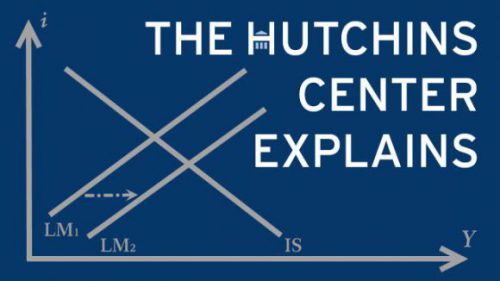Studies in this week’s Hutchins Roundup find that attempts by advanced economies to reduce debt after the global financial crisis contributed to a permanent decline in their GDP, the global financial crisis increased health care spending, and more.
Fiscal consolidations in advanced economies after the financial crisis were self-defeating
Antonio Fatás of INSEAD and Lawrence Summers of Harvard conclude that the global financial crisis led to a permanent reduction in GDP in all advanced economies. They show that a significant part of the decline in actual and potential GDP is directly attributable to the fiscal consolidations implemented from 2009 to 2011. They argue that their results support the hypothesis of self-defeating fiscal consolidations, whereby attempts to reduce debt are ineffective: as countries cut spending or raise taxes, GDP is lowered enough to lead to an increase in the debt to GDP ratio.
Health spending slowed down in spite of the financial crisis, not because of it
Using county-level data and variation among states in their adoption of credit reforms before the financial crisis, Marco DiMaggio and Matthew Mazewski of Columbia, Andrew Haughwout and Maxim Pinkovskiy of the New York Fed, and Amir Kermani of the University of California – Berkeley show that, contrary to conventional wisdom, the financial crisis increased health spending, and that at least some portion of this increase comes from deteriorating health before and during the crisis.
Veterans Affairs Disability Compensation program reduces labor force participation
David Autor and Kyle Greenberg of MIT, Mark Duggan of Stanford, and David Lyle of the U.S. Military Academy find that the expansion of the Department of Veterans Affairs’ Disability Compensation program to a new group of Vietnam-era veterans reduced their labor force participation by 18 percentage points. The increase in disability benefits received by those veterans, however, more than offset the reduction in earnings.
Chart of the week: Medicaid expansion protected some against financial hardship
Quote of the week: “[E]stimates of the equilibrium interest rate suggest that it is very low, possibly even negative, in the euro area, the US and other advanced economies,” says European Central Bank official Mario Draghi
“[L]ow interest rate environment is a consequence of a global excess of desired saving over planned investment, which results from rising net savings as populations plan for retirement; from increased demand for and lower supply of safe assets; from relatively less public capital expenditure in a context of slowing population growth in advanced economies; from the secular shift from industries intensive in physical capital to those more intensive in human capital; and from a slowdown in productivity growth that reduces returns on investment. Again, those factors may not be distributed homogenously across economies, but their effects are global because they propagate through global financial markets. With internationally mobile capital, the clearing interest rate that balances saving and investment is more a global concept than a local one.”
– Mario Draghi, President of the European Central Bank
The Brookings Institution is committed to quality, independence, and impact.
We are supported by a diverse array of funders. In line with our values and policies, each Brookings publication represents the sole views of its author(s).





Commentary
Hutchins Roundup: Fiscal consolidations, health spending, and more
July 7, 2016